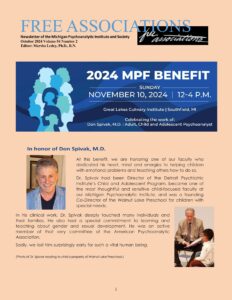The Analyst’s View: Mel Bornstein, M.D.
22 Mar 2024 |

David Dietrich, Ph.D., Editor

Why I became a psychoanalyst:
My journey toward becoming an analyst
Melvin Bornstein, M.D.
When I entered psychoanalytic training, I did not know how to pursue my hope of living fully with courage. I felt inhibited. I did not know how to manage my feelings; I felt numb and dumb; I did well in school. I wanted to become a doctor. As a doctor I would be accepted and respected. I did best with objective problems of science. I was at a loss with subjective matters that involved feelings and love.
Two events changed my entire internal equilibrium. I was accepted to medical school and I fell In love with a high school girlfriend. For a short time, I felt optimistic about my life to be. To my shock my girlfriend developed a minor medical problem and I became symptomatic that she was going to be sick and then die. I would lose everything. It was like I was being invaded by an emotional force, an outlaw, that invaded me and interfered with my ability to function. I felt that because of this inner interfering burden I would fail in medical school and life itself. I would lose everything. I was defeating myself
During my first year in medical school, I attended lectures by John Dorsey who was Chair of the Department of Psychiatry. He conveyed a message that all the pain and suffering that exists within us are part of our identity, that is who we are and have to own and understand it. When we really understand, we can use our suffering for our creativity and love of life. It is a problem, if we respond by saying that is not me. I must get rid of it. In other words, I must get rid of my emotional burden. I am not causing it, something outside of me is causing it.
I knew he was right. Psychoanalytic therapy could help in owning what was inside that we did not want to own. It was this idea that helped me decide I wanted analytic training to discover and use parts of me.
I discovered that inside of me I had deep experiences. When I was six years old my mother who had been loving lost interest in me and became mentally ill. She was institutionalized and my father and I moved in with an aunt and uncle. I tried to rid myself of memories of my mother by becoming phobic toward any memories of her or anything related to her.
As I began to see success in my life, with medical school and falling in love, the pain, suffering and defeat in me about my mother lingered and came back in the form of my worry about failing school and my marriage. It was like I was bringing back a painful past attached to a current experience so I could change it. It makes no sense but neither does the persistent worry about an inevitable failure. It was like saying I am not going to move forward until I can get rid of this old suffering. I was trying to change something inside of me by avoiding having to deal with what happened to me.
Psychoanalysis is a treatment to achieve living well with that understanding. It results in changing people’s lives by offering more love, creativity and growth with the bad things that have happened which are part of living well.

 Brochure of Educational Programs
Brochure of Educational Programs
One Response to “The Analyst’s View: Mel Bornstein, M.D.”
Shelly Broder
Mel, Your love, optimism and realistic view of living well, including leaning in to the moment in the face of “mind-boggling tragedy,” is a solid analytic stance. We can regroup, even if daily. Thank-you, as always.